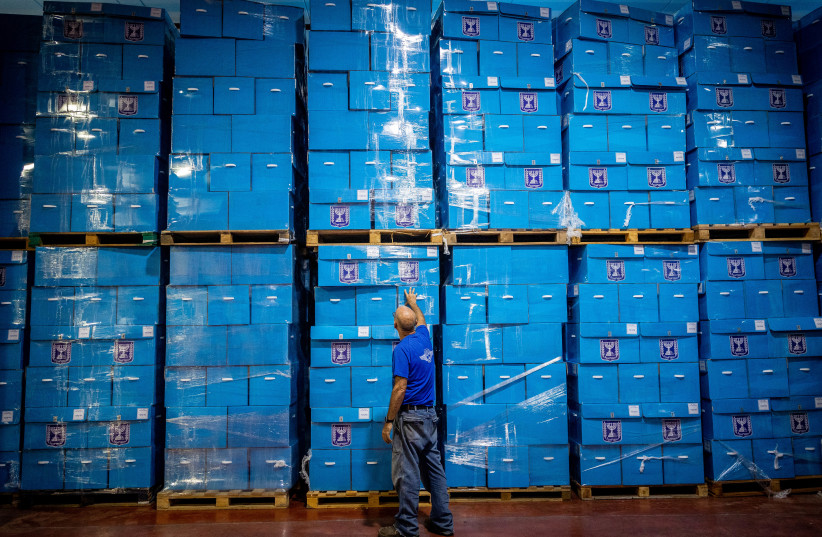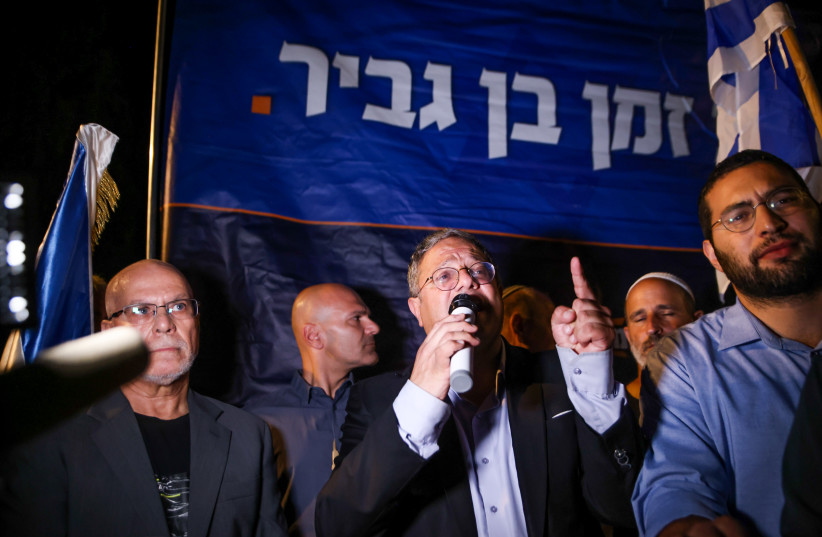The holidays are finally over, and it’s clear sailing until Election Day in two weeks. Most parties set their sights in advance on these two weeks, to gain the support of approximately 20% of eligible voters who have not yet decided for which list they will vote.
The following are a number of themes to follow until the November 1 election:
1. Voting percentages, voting percentages, and more voting percentages
For most people, the percentage of people who end up voting does not matter too much. But the devil is in the details.
The voting percentage in two mainly lower socioeconomic groups will likely decide the election: the Arab sector and those from Jewish development towns.

A relatively low percentage of development-town voters cast their vote in the last election in March 2021. The Likud’s campaigners realized early on that getting more out to vote will likely be enough for Likud leader and opposition head MK Benjamin Netanyahu and his allies to pass the 61-seat threshold and form a government, for two reasons.
First, development towns traditionally vote overwhelmingly for the Likud. A higher voting percentage means far more votes for the Likud than any other party, and could tilt the scale in its favor.
Second, the higher the general voting percentage, the higher the chance that one of the Arab parties will not pass the electoral threshold. This will likely lead Netanyahu to victory because as the number of votes grows, the 3.25% threshold grows as well.

In the previous election, the threshold was worth 143,327 votes with the general voting turnout at 67.44%. If that number would have been 70%, for example, the threshold would have grown by approximately 5,000 votes.
This could end up being the difference in whether a party passes the threshold. Ra’am and Hadash-Ta’al are polling not far above the threshold now, and if either fails to pass, over 100,000 votes will likely be wasted and victory for Netanyahu is nearly certain.
This is exactly why the Arab vote matters so much for the Center-Left bloc. In the previous election, 80% of Israeli Arabs voted for the Arab parties, so raising the percentage of Arab voters will give Ra’am and Hadash-Ta’al a necessary boost. This is especially important since the third Arab party, Balad, is expected not to pass, and thus all votes cast for it will be wasted.
Yesh Atid leader and Prime Minister Yair Lapid is expected to visit at least one Arab city in the next two weeks to encourage the vote there, and left-wing parties such as Meretz are also actively encouraging the Arab vote. The Right, on the other hand, will continue to refrain from stirring anger or resentment among Israeli Arabs, which could drive up the voting percentage.
2. The Elephant in the Room - Ayelet Shaked
Voting percentages will also affect Interior Minister Ayelet Shaked’s Bayit Yehudi Party, which has failed to pass the electoral threshold in every poll.
The Likud’s official campaign policy right now is to convince Shaked to drop out. But a poll last week showed that should she drop out, the Right will actually lose a seat – since she is drawing more voters away from Defense Minister Benny Gantz’s National Unity Party than from the Likud or Religious Zionism Party.

Polls have shown that an endorsement by Netanyahu will likely push Shaked comfortably above the threshold. Shaked is creeping slowly toward the 3% mark, and her surpassing it may end up being the deciding factor in the election.
Look out for a last-minute change in the Likud’s policy.
3. It's the security situation, stupid
As always in Israel, security is a central player in every election, and the security situation has deteriorated severely in recent weeks.
The northern West Bank is especially tense, with the Lions’ Den terrorist group carrying out attacks on soldiers and civilians on a daily basis. Unrest also broke out in east Jerusalem, coming to a head last week when residents of 10 east Jerusalem neighborhoods rioted, stoning police cars and civilian vehicles with children inside and seriously injuring a teenager with a brick.
Security deteriorations traditionally benefit right-wing candidates politically, and this time is no exception. Netanyahu, RZP leaders Bezalel Smotrich and Itamar Ben-Gvir, and others on the Right are demanding a harsher response, and blaming the government for its weakness and inability to properly deal with the situation.

This message resonates with all Israelis, and if the situation does not improve quickly, it may seriously damage Lapid and Gantz on Election Day.
However, a proclaimed “Day of Rage” on Friday did not develop into rioting on the Temple Mount, which is always a trigger for far more violence. The rioting in Shuafat and other east Jerusalem neighborhoods also lessened after travel restrictions were eased at the end of the week. The restrictions began on October 8, when a terrorist from the Shuafat refugee camp murdered soldier Noa Lazar and escaped back into the camp. He has yet to be found.
However, if the security situation does come under control, Lapid and Gantz may gain by arguing that they handled the situation “responsibly,” and depicting as irresponsible the calls by Ben-Gvir and others to launch a full-scale operation in Jenin and Nablus.
4. The Lebanon maritime border deal
The Lebanon border agreement was placed on the Knesset floor on Wednesday, and could pass final ratification in the cabinet, beginning on October 26.
The deal dominated headlines last week and played into the hands of Lapid, who in presenting it as “historic” cited the backing of all of Israel’s security agencies as proof that the deal was beneficial for Israel – and accused Netanyahu, who fiercely criticized the deal and called it a “historic surrender,” of spreading lies and acting against Israel’s strategic interest.
Netanyahu gained some points when the cabinet, on Lapid’s bidding, ignored Attorney-General Gali Baharav-Miara’s advice and refused to bring the deal to a Knesset vote. This served as fodder for Netanyahu and others on the Right to argue that not only was the deal a surrender to Hezbollah, but Lapid was pushing it through the backdoor for election purposes.

The High Court will hear the case against Lapid’s decision to skip the Knesset vote on October 24. If it decides to accept the appeals and force the government’s hand, Lapid will suffer a serious blow just a week before the election: the deal will not be signed before November 1, and Lapid will appear as having acted rashly and irresponsibly.
One caveat, however, is that the Right is now hanging its hopes on the High Court, which it consistently argues should not have this exact type of involvement in political matters. That is why the Likud refrained from appealing to the High Court. The appeal was filed by private organizations and by Ben-Gvir.
If the High Court accepts the appeal, the blow to Lapid will be far more significant, but the Lapid bloc would still be able to score some points by showing that it respected the High Court even when its decisions go against them.
5. It's going to get ugly.
Finally, during the next two weeks, expect the campaigns to get ugly and personal. These are the weeks in which both sides will leak any damaging information they have, and to try to have the media focus on it.
Hints of this appeared around the Lebanon deal, with Netanyahu’s son Yair and some Channel 14 journalists circulating a conspiracy theory that Lapid made a number of secret trips to France without bodyguards in order to promote the border deal and exploit it for political and perhaps even financial gain.
On the flip side, Haaretz published an article that delved into Netanyahu’s military career in the elite Sayeret Matkal commando unit and argued that it was not as impressive as the former prime minister has made it out to be.
These and other nastier accusations and theories will likely surface in the next two weeks, as Israel’s political parties gallop into the home stretch of yet another election.
